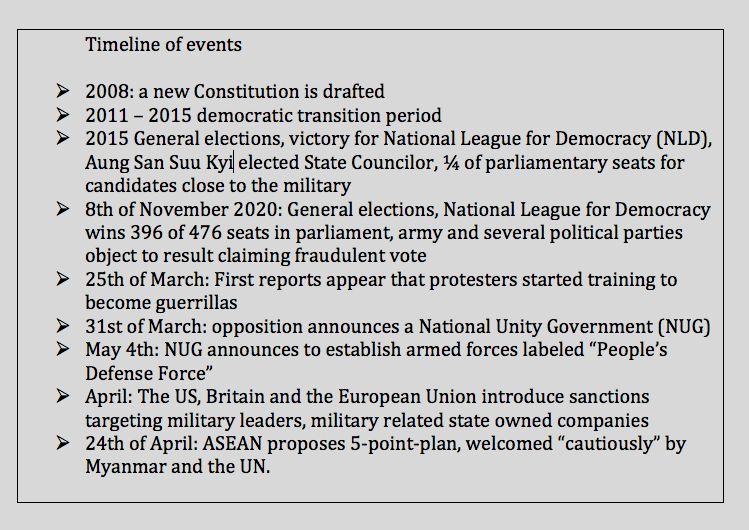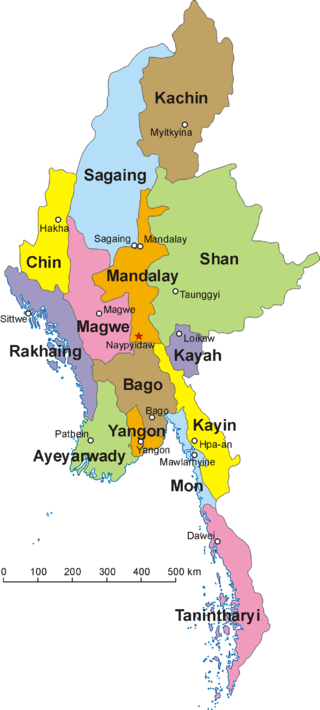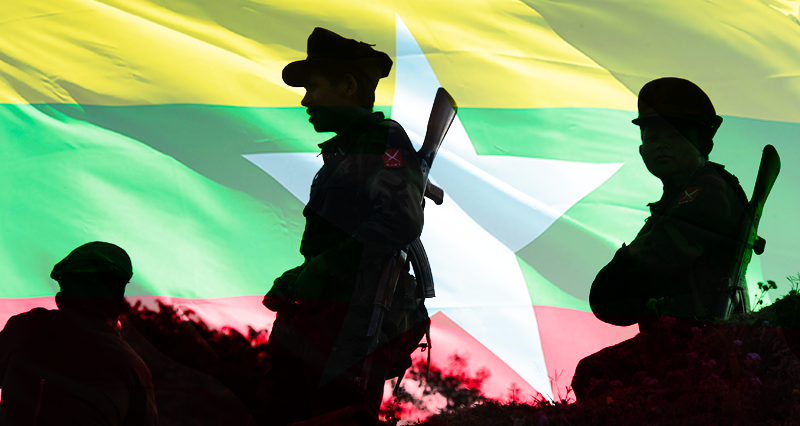Myanmar has not come to peace since the military took power on February 1st, 2021. Protests in the country continue, partly turning into an armed rebellion with ethnical background, while international actors are divided in their approach to the new established military government.
Domestic protests turn into armed rebellion
Domestic protests continued in the country against the military take over, but numbers of participating people seem to have diminished. Photos presented by Western media display mostly a small group of protesting people taking part in the country that has a population of approximately 60 million.
Still, western news agencies report frequently of government forces’ shoots on protesters, with transmitting unconfirmed reports of killed civilians.
Burmese organizations outside of Myanmar had called to flare up protests again beginning of May, calling for a “Myanmar Spring Revolution” in reference to the “Arab Spring”, reports the German news channel DW.
Despite diminishing numbers in protests, the opposition forces have begun to reorganize and militarize their struggle.

The Committee for Representing Pyidaungsu Hluttaw (CRPH), which represents Myanmar’s ousted civilian government, announced on March 31st that it plans to establish a National Unity Government (NUG) that will renounce the 2008 Myanmar constitution in favor of the Federal Democracy Charter, reported Bloomberg.
The NUG has announced to establish an armed group called “People’s Defense Force”.

Kachin Independence Army (KIA) and Karen National Union (KNU) are both clashing with the government in recent weeks.
A military helicopter was shot down by the Kachin Independence Army (KIA), one of Myanmar’s leading rebel groups, in retaliation to air strikes by the military, the group announced on May 2nd.
Both groups, KIA and KNU are pursuing an armed struggle as guerilla organizations, claiming to represent different ethnic minorities in Myanmar
A state run news agency reported on May 3rd that in the past 36 hours, 11 explosions were heard in the country’s biggest city Yangon. Attacks on military appointed local administrator took place.
American channel CNN reported live from a guerrilla camp, where alleged college students were trained with ethnic armed groups and learned how to defend themselves against the military.
The oppositional Irrawady news portal reports that beginning May, an attack took place on a station of Myanmar-China pipelines, killing 3 security guards.
Ethnic guerrilla activities flare up predominantly in the states of Kachin, Shan and Kayin, located in the north and east of the country.
Diplomatic pressure from the West
Western countries led by the US continue calling the military takeover a “coup”, condemning the event and demanding the immediate release of detained former State Councilor Aung San Suu Kyi. The US has introduced April 8 sanctions against a Burmese state owned gems company and widened sanctions on April 21 to include two more state owned enterprises.
US Secretary of State Blinken has also called other countries to “reconsider economic ties to the Burmese military” on May 4th, during the G-7 Summit.
On April 1st, the British Foreign Secretary Dominic Raab announced additional sanctions against military related enterprises in Myanmar, including an asset freeze. The UK had already sanctioned a military conglomerate in March and 9 military leaders, including the Ministers of Defense and Home Affairs.
Myanmar’s defected Ambassador to UN calls for harder US sanctions
Myanmar’s ambassador to the United Nations told the U.S. Congress on May 4th that Washington should target the state-run Myanmar oil and gas company and a state-owned bank with sanctions, reports Reuters.
Ambassador Kyaw Moe Tun, a representative of elected lawmakers who oppose Myanmar’s military junta, also warned that the crisis triggered by a Feb. 1 take over in the Southeast Asian nation threatened regional security.
ASEAN’s 5-point plan
Meanwhile, most of Myanmar’s neighbors and Asian countries have taken a mediating stance, rejecting Western outright condemnation of the military takeover.
General Min Aung Hlaing took part in the ASEAN (Association of South East Asian Nations) on April 24 in Jakarta, Indonesia. Western human rights organizations opposed strongly against the invitation.
On the meeting, the ASEAN agreed upon a 5-point plan:
On the situation in Myanmar, the Leaders reached consensus on the following:
• First, there shall be immediate cessation of violence in Myanmar and all parties shall exercise utmost restraint.
• Second, constructive dialogue among all parties concerned shall commence to seek a peaceful solution in the interests of the people.
• Third, a special envoy of the ASEAN Chair shall facilitate mediation of the dialogue process, with the assistance of the Secretary-General of ASEAN.
• Fourth, ASEAN shall provide humanitarian assistance through the AHA Centre.
• Fifth, the special envoy and delegation shall visit Myanmar to meet with all parties concerned.
For the ASEAN statement see here.
The leader of the Myanmar military, General Hlaing reacted carefully to the plan. In a statement published on the website of Myanmar’s information ministry, the junta said it had conveyed to ASEAN that it would “give careful consideration to constructive suggestions” made by regional leaders during Saturday’s talks. But it said the priority at the moment was to “maintain law and order” and “restore community peace and tranquility”.
The United Nations Security Council “welcomed and strongly supported” the plan, as the Presidency declared in a written statement.
The UNSC asked Myanmar authorities to allow UN Special Envoy Christine Schraner Burgener immediate access to the country.
The Chinese Foreign Minister Wang Yi had welcomed the ASEAN initiative even before the summit’s meeting, reports the Chinese Global Times. It is in line with the interests of the Myanmar people and the international society to support ASEAN to constructively participate in Myanmar’s domestic reconciliation process in the ASEAN way, and push for the easing and cooling down of the Myanmar situation, Chinese State Councilor and Foreign Minister Wang Yi said at the high-level open debate held by the UN Security Council on April 19th.
For the time being, regional diplomacy efforts stand a face off with Western initiatives that rely on sanctions and ethnic separatism. The UN Human Rights Office itself made on April the 13th the comparison of Myanmar with the conflict in Syria, where ethnic groups have been used by Western powers too.
The fact that ethnic terror groups’ attacks flared up beginning of May indicates the West is not going to give up on its model.

















Leave a Reply